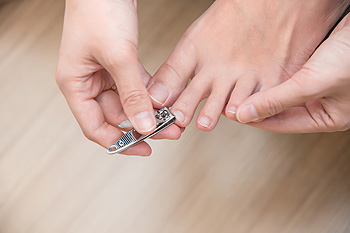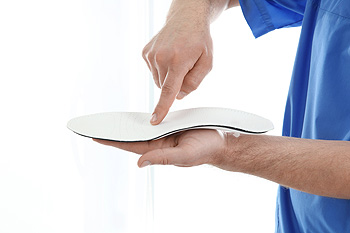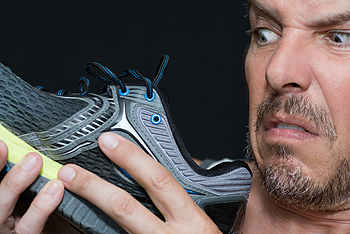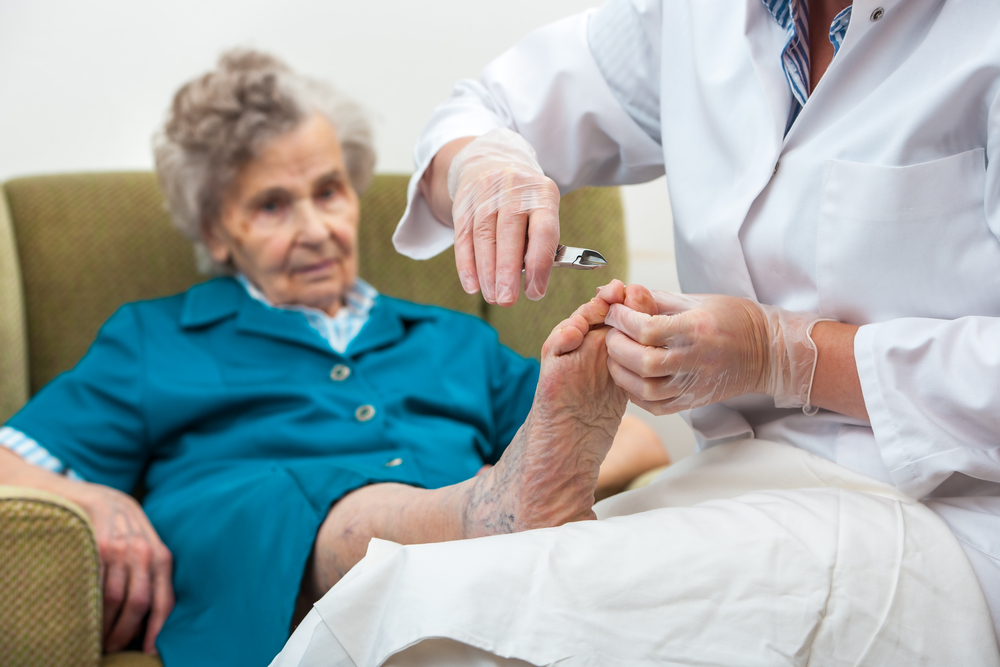Call Us Today! (203) 975-9600
SAME DAY APPOINTMENTS AVAILABLE
July 2019
Methods on Maintaining Proper Foot Care
 When the feet are properly cared for on a daily basis, certain foot conditions may be prevented from occurring. Athlete’s foot may be avoided when the feet are washed and thoroughly dried daily, especially between the toes. When a good moisturizer is applied, it may help to prevent cracked heels from developing. The importance of trimming the toenails properly is necessary in possibly preventing the painful condition known as ingrown toenails. Additionally, the feet will feel more comfortable when the correct size shoe is worn, and this can be accomplished if shoes are tried on in the afternoon when the feet are their largest. If you would like additional information about how to maintain proper foot care, it is advised to seek the counsel of a podiatrist.
When the feet are properly cared for on a daily basis, certain foot conditions may be prevented from occurring. Athlete’s foot may be avoided when the feet are washed and thoroughly dried daily, especially between the toes. When a good moisturizer is applied, it may help to prevent cracked heels from developing. The importance of trimming the toenails properly is necessary in possibly preventing the painful condition known as ingrown toenails. Additionally, the feet will feel more comfortable when the correct size shoe is worn, and this can be accomplished if shoes are tried on in the afternoon when the feet are their largest. If you would like additional information about how to maintain proper foot care, it is advised to seek the counsel of a podiatrist.
Everyday foot care is very important to prevent infection and other foot ailments. If you need your feet checked, contact one of our podiatrists from Preferred Footcare, LLC. Our doctors can provide the care you need to keep you pain-free and on your feet.
Everyday Foot Care
Often, people take care of their bodies, face and hair more so than they do for their feet. But the feet are a very important aspect of our bodies, and one that we should pay more attention to. Without our feet, we would not be able to perform most daily tasks.
It is best to check your feet regularly to make sure there are no new bruises or cuts that you may not have noticed before. For dry feet, moisturizer can easily be a remedy and can be applied as often as necessary to the affected areas. Wearing shoes that fit well can also help you maintain good foot health, as well as making it easier to walk and do daily activities without the stress or pain of ill-fitting shoes, high heels, or even flip flops. Wearing clean socks with closed shoes is important to ensure that sweat and bacteria do not accumulate within the shoe. Clean socks help to prevent Athlete’s foot, fungi problems, bad odors, and can absorb sweat.
If you have any questions please feel free to contact our office located in Stamford, CT . We offer the newest diagnostic and treatment technologies for all your foot and ankle needs.
Types of Orthotics
 Orthotics are prescribed shoe inserts that can correct biomechanical foot issues. A podiatrist can evaluate your foot to see if a customized orthotic device is necessary, or if a standard shoe insert will suffice. Should you need orthotics, there are two different kinds. One type is rigid orthotics, otherwise known as functional orthotics. They are typically made from a material such as plastic, and are used in shoes with low heels in order to ease foot strain. The other type is soft orthotics, also known as accommodative orthotics. These provide a soft cushioning to help with issues such as plantar fasciitis or diabetic foot ulcers. These orthotics are bulky, so a special type of shoe may be required. Orthotics are typically more expensive than shoe inserts, but may last longer as they are made specifically for you. If you believe you may benefit from orthotics, or would like more information, you should consult with a podiatrist.
Orthotics are prescribed shoe inserts that can correct biomechanical foot issues. A podiatrist can evaluate your foot to see if a customized orthotic device is necessary, or if a standard shoe insert will suffice. Should you need orthotics, there are two different kinds. One type is rigid orthotics, otherwise known as functional orthotics. They are typically made from a material such as plastic, and are used in shoes with low heels in order to ease foot strain. The other type is soft orthotics, also known as accommodative orthotics. These provide a soft cushioning to help with issues such as plantar fasciitis or diabetic foot ulcers. These orthotics are bulky, so a special type of shoe may be required. Orthotics are typically more expensive than shoe inserts, but may last longer as they are made specifically for you. If you believe you may benefit from orthotics, or would like more information, you should consult with a podiatrist.
If you are having discomfort in your feet and would like to try orthotics, contact one of our podiatrists from Preferred Footcare, LLC. Our doctors can provide the care you need to keep you pain-free and on your feet.
What Are Orthotics?
Orthotics are inserts you can place into your shoes to help with a variety of foot problems such as flat feet or foot pain. Orthotics provide relief and comfort for minor foot and heel pain but can’t correct serious biomechanical problems in your feet.
Over-the-Counter Inserts
Orthotics come in a wide variety of over-the-counter inserts that are used to treat foot pain, heel pain, and minor problems. For example, arch supports can be inserted into your shoes to help correct overarched or flat feet, while gel insoles are often used because they provide comfort and relief from foot and heel pain by alleviating pressure.
Prescription Orthotics
If over-the-counter inserts don’t work for you or if you have a more severe foot concern, it is possible to have your podiatrist prescribe custom orthotics. These high-quality inserts are designed to treat problems such as abnormal motion, plantar fasciitis, and severe forms of heel pain. They can even be used to help patients suffering from diabetes by treating foot ulcers and painful calluses and are usually molded to your feet individually, which allows them to provide full support and comfort.
If you are experiencing minor to severe foot or heel pain, it’s recommended to speak with your podiatrist about the possibilities of using orthotics. A podiatrist can determine which type of orthotic is right for you and allow you to take the first steps towards being pain-free.
If you have any questions please contact our office located in Stamford, CT . We offer the newest diagnostic and treatment technologies for all your foot and ankle needs.
Methods That May Help to Prevent Falling
 Research has indicated that falling is a common occurrence among seniors in the United States. Many elderly people may avoid participating in certain activities as a result of a fear of falling. There are measures that can be implemented which may reduce the risk of falling. These can include removing any clutter from the main living areas in the home, improving lighting conditions, and removing any loose carpeting. Additionally, it is generally beneficial to install grab bars in the shower and toilet area, as this can be helpful in preventing falling. It is important to wear shoes that fit correctly to aid in preventing unnecessary tripping. Many elderly people can reduce the risk of falling when walkers are used and slowing down is beneficial while performing daily activities. If you would like additional information about how to prevent falling, it is suggested to speak with a podiatrist.
Research has indicated that falling is a common occurrence among seniors in the United States. Many elderly people may avoid participating in certain activities as a result of a fear of falling. There are measures that can be implemented which may reduce the risk of falling. These can include removing any clutter from the main living areas in the home, improving lighting conditions, and removing any loose carpeting. Additionally, it is generally beneficial to install grab bars in the shower and toilet area, as this can be helpful in preventing falling. It is important to wear shoes that fit correctly to aid in preventing unnecessary tripping. Many elderly people can reduce the risk of falling when walkers are used and slowing down is beneficial while performing daily activities. If you would like additional information about how to prevent falling, it is suggested to speak with a podiatrist.
Preventing falls among the elderly is very important. If you are older and have fallen or fear that you are prone to falling, consult with one of our podiatrists from Preferred Footcare, LLC. Our doctors will assess your condition and provide you with quality advice and care.
Every 11 seconds, an elderly American is being treated in an emergency room for a fall related injury. Falls are the leading cause of head and hip injuries for those 65 and older. Due to decreases in strength, balance, senses, and lack of awareness, elderly persons are very susceptible to falling. Thankfully, there are a number of things older persons can do to prevent falls.
How to Prevent Falls
Some effective methods that older persons can do to prevent falls include:
- Enrolling in strength and balance exercise program to increase balance and strength
- Periodically having your sight and hearing checked
- Discuss any medications you have with a doctor to see if it increases the risk of falling
- Clearing the house of falling hazards and installing devices like grab bars and railings
- Utilizing a walker or cane
- Wearing shoes that provide good support and cushioning
- Talking to family members about falling and increasing awareness
Falling can be a traumatic and embarrassing experience for elderly persons; this can make them less willing to leave the house, and less willing to talk to someone about their fears of falling. Doing such things, however, will increase the likelihood of tripping or losing one’s balance. Knowing the causes of falling and how to prevent them is the best way to mitigate the risk of serious injury.
If you have any questions, please feel free to contact our office located in Stamford, CT . We offer the newest diagnostic and treatment technologies for all your foot care needs.
Sweaty Feet and Plantar Hyperhidrosis
 The medical condition that is referred to as plantar hyperhidrosis is indicative of excessively sweaty feet. Patients who have this condition have difficulty in keeping their feet dry for the majority of the day. This is often the result of large amounts of sweat that is produced by the sweat glands, and this can be an uncomfortable issue for patients who suffer from this condition. There are methods that can be implemented which may help to prevent plantar hyperhidrosis from developing. Using a foot powder that has antifungal properties may help to alleviate some of the odor that is often associated with this ailment. It may also be beneficial to wear shoes that are made of a breathable material, which may include leather or canvas. Additionally, it is important to regulate the body temperature, and this can be accomplished by drinking plenty of water for the majority of the day. If you feel you have this condition, it is advised that you seek the counsel of a podiatrist who can guide you toward beginning proper treatment.
The medical condition that is referred to as plantar hyperhidrosis is indicative of excessively sweaty feet. Patients who have this condition have difficulty in keeping their feet dry for the majority of the day. This is often the result of large amounts of sweat that is produced by the sweat glands, and this can be an uncomfortable issue for patients who suffer from this condition. There are methods that can be implemented which may help to prevent plantar hyperhidrosis from developing. Using a foot powder that has antifungal properties may help to alleviate some of the odor that is often associated with this ailment. It may also be beneficial to wear shoes that are made of a breathable material, which may include leather or canvas. Additionally, it is important to regulate the body temperature, and this can be accomplished by drinking plenty of water for the majority of the day. If you feel you have this condition, it is advised that you seek the counsel of a podiatrist who can guide you toward beginning proper treatment.
If you are suffering from hyperhidrosis contact one of our podiatrists of Preferred Footcare, LLC. Our doctors can provide the care you need to attend to all of your foot and ankle needs.
Hyperhidrosis of the Feet
Hyperhidrosis is a rare disorder that can cause people to have excessive sweating of their feet. This can usually occur all on its own without rigorous activity involved. People who suffer from hyperhidrosis may also experience sweaty palms.
Although it is said that sweating is a healthy process meant to cool down the body temperature and to maintain a proper internal temperature, hyperhidrosis may prove to be a huge hindrance on a person’s everyday life.
Plantar hyperhidrosis is considered to be the main form of hyperhidrosis. Secondary hyperhidrosis can refer to sweating that occurs in areas other than the feet or hands and armpits. Often this may be a sign of it being related to another medical condition such as menopause, hyperthyroidism and even Parkinson’s disease.
In order to alleviate this condition, it is important to see your doctor so that they may prescribe the necessary medications so that you can begin to live a normal life again. If this is left untreated, it is said that it will persist throughout an individual’s life.
A last resort approach would be surgery, but it is best to speak with your doctor to find out what may be the best treatment for you.
If you have any questions please feel free to contact our office located in Stamford, CT . We offer the newest diagnostic and treatment technologies for all your foot and ankle needs.
It's Time for Beautiful Feet
The Importance of Caring for Diabetic Feet
 Diabetic patients may develop serious foot conditions as a result of elevated blood sugar levels. Some people experience neuropathy. Symptoms of this ailment often include a numbing or tingling sensation, and it may be painful to walk. Additionally, it can be difficult to feel any cuts or irritations on the feet, and this may lead to the formation of diabetic foot ulcers. This occurs when the cuts become infected, and if not promptly treated, gangrene may develop. People who are diabetic often notice changes in the feet. These consist of swelling, ingrown toenails, extremely dry skin, and temperature changes. If there are open wounds, it is suggested to keep the area covered and dry, and it may be beneficial to wear a supportive boot. Diabetic patients are urged to be under the care of a podiatrist who can properly treat any foot condition that is associated with diabetes.
Diabetic patients may develop serious foot conditions as a result of elevated blood sugar levels. Some people experience neuropathy. Symptoms of this ailment often include a numbing or tingling sensation, and it may be painful to walk. Additionally, it can be difficult to feel any cuts or irritations on the feet, and this may lead to the formation of diabetic foot ulcers. This occurs when the cuts become infected, and if not promptly treated, gangrene may develop. People who are diabetic often notice changes in the feet. These consist of swelling, ingrown toenails, extremely dry skin, and temperature changes. If there are open wounds, it is suggested to keep the area covered and dry, and it may be beneficial to wear a supportive boot. Diabetic patients are urged to be under the care of a podiatrist who can properly treat any foot condition that is associated with diabetes.
Diabetic foot care is important in preventing foot ailments such as ulcers. If you are suffering from diabetes or have any other concerns about your feet, contact one of our podiatrists from Preferred Footcare, LLC. Our doctors can provide the care you need to keep you pain-free and on your feet.
Diabetic Foot Care
Diabetes affects millions of people every year. The condition can damage blood vessels in many parts of the body, especially the feet. Because of this, taking care of your feet is essential if you have diabetes, and having a podiatrist help monitor your foot health is highly recommended.
The Importance of Caring for Your Feet
- Routinely inspect your feet for bruises or sores.
- Wear socks that fit your feet comfortably.
- Wear comfortable shoes that provide adequate support.
Patients with diabetes should have their doctor monitor their blood levels, as blood sugar levels play such a huge role in diabetic care. Monitoring these levels on a regular basis is highly advised.
It is always best to inform your healthcare professional of any concerns you may have regarding your feet, especially for diabetic patients. Early treatment and routine foot examinations are keys to maintaining proper health, especially because severe complications can arise if proper treatment is not applied.
If you have any questions please feel free to contact our office located in Stamford, CT . We offer the newest diagnostic and treatment technologies for all your foot and ankle needs.









